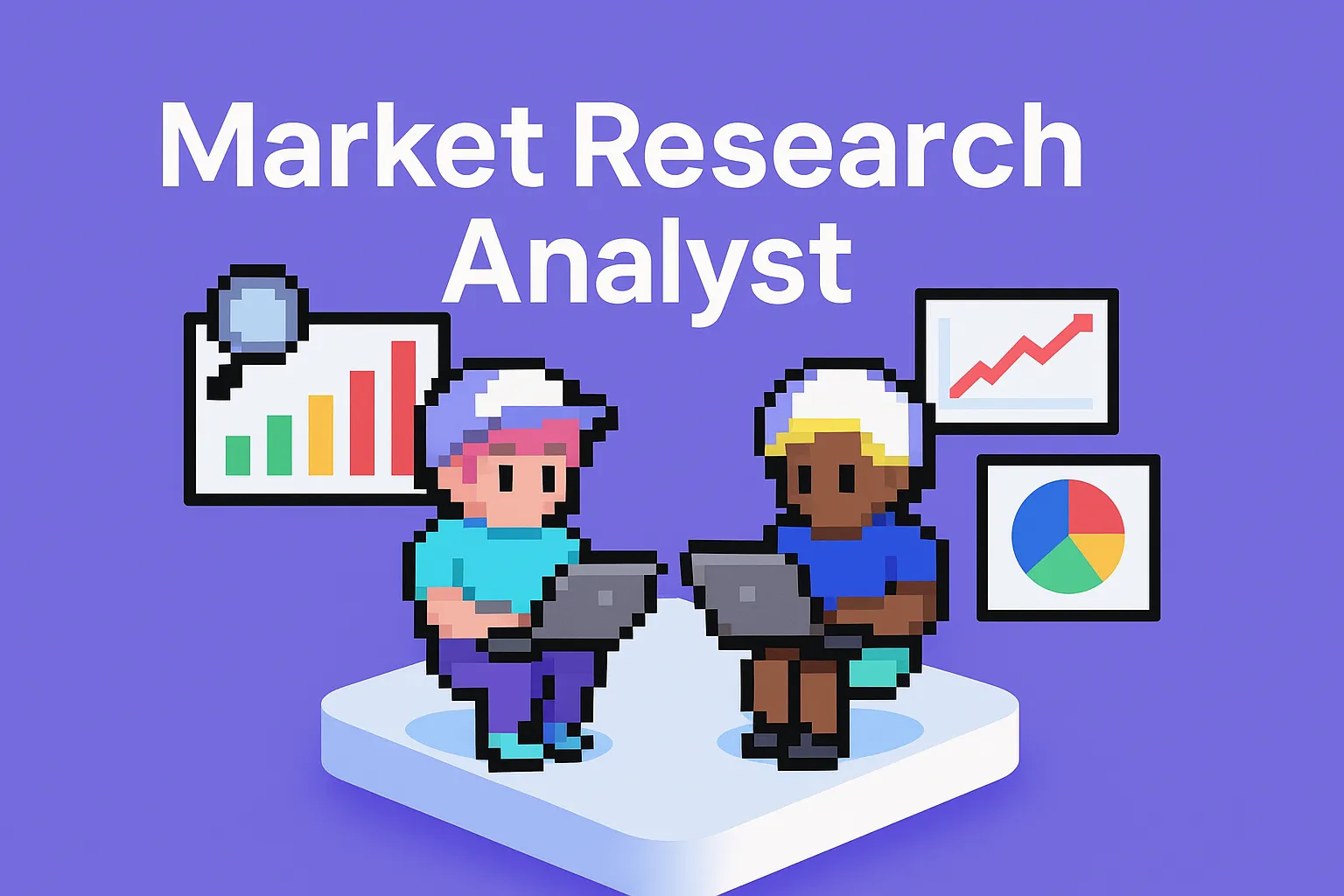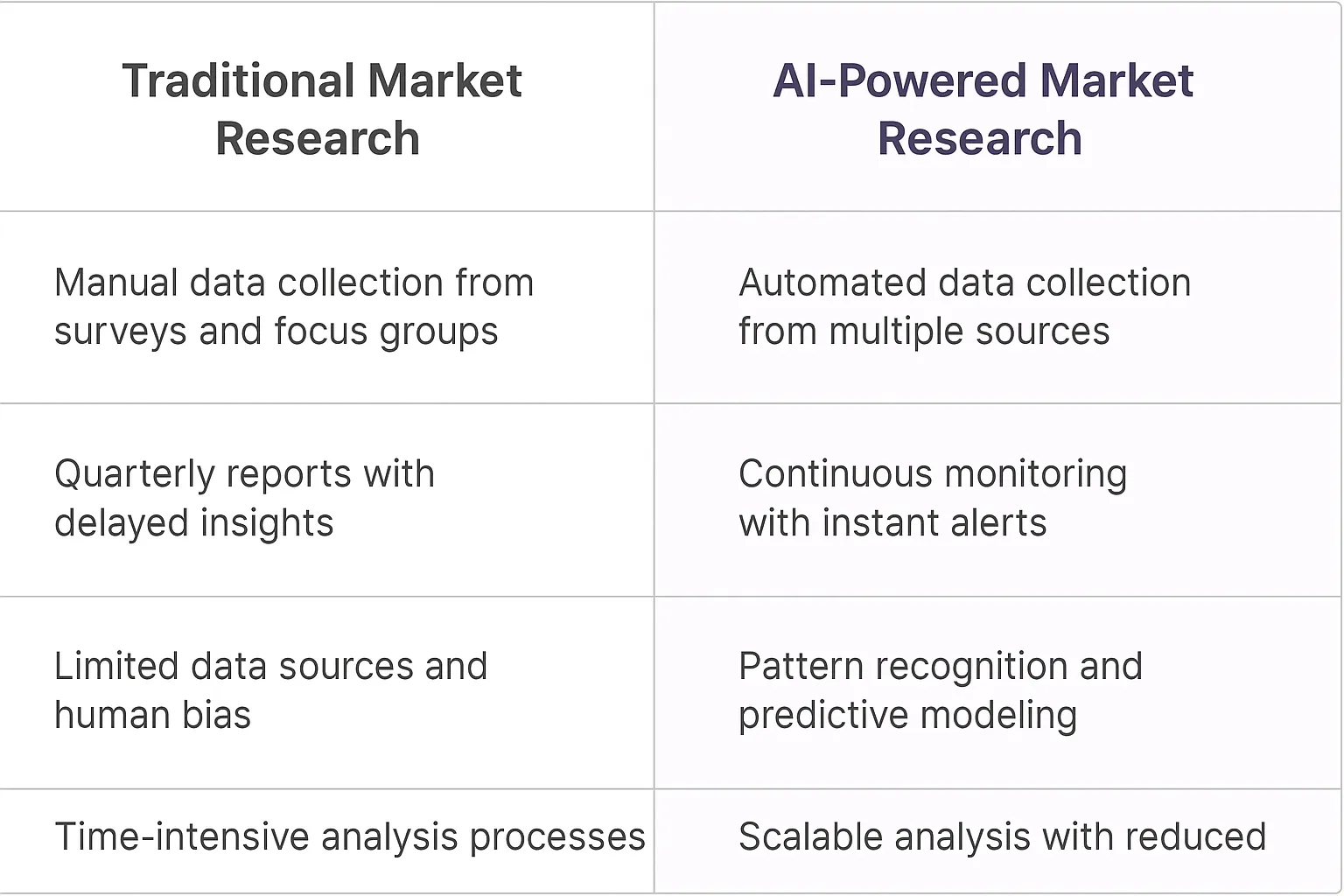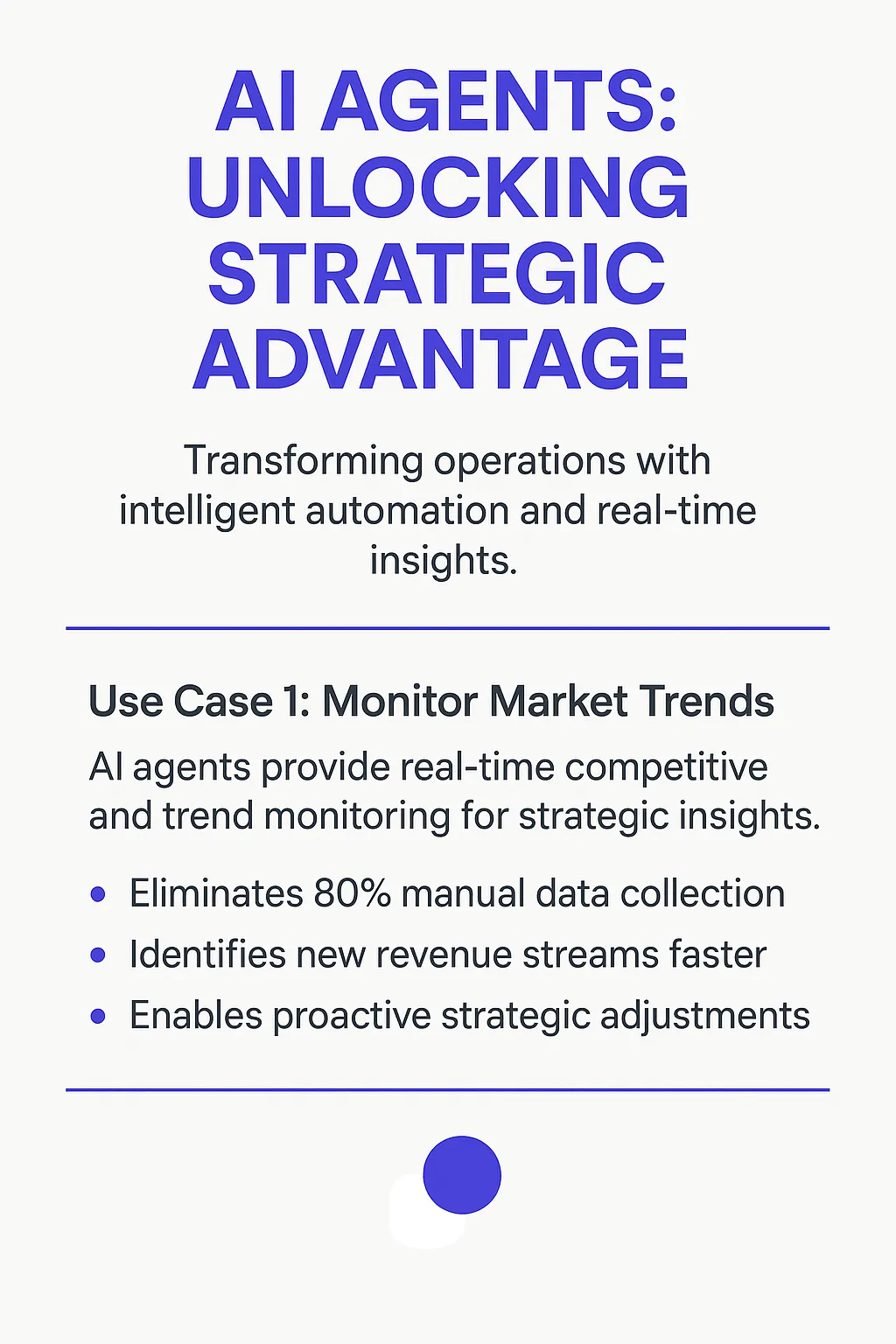Market Research Analysts are the data detectives of the business world. They're the folks who dive deep into consumer behavior, market trends, and competitive landscapes to unearth insights that drive business decisions. Traditionally, they've been armed with a mix of statistical know-how, industry expertise, and a knack for connecting dots that others might miss. But now, they're getting a serious upgrade in the form of AI agents.
The integration of AI agents is supercharging the capabilities of Market Research Analysts. These digital teammates bring a suite of game-changing features to the table:1. Data Vacuum: AI agents can suck up and process vast amounts of data from diverse sources at lightning speed.2. Pattern Recognition: They're able to spot trends and correlations that might escape even the most eagle-eyed human analyst.3. Real-time Analysis: AI agents provide continuous monitoring and instant alerts on significant market shifts.4. Predictive Modeling: They can run complex simulations to forecast market scenarios and consumer behavior.5. Natural Language Processing: Advanced NLP capabilities allow AI agents to analyze text data for sentiment and context.6. Personalization at Scale: They can create hyper-specific customer segments for targeted strategies.7. Automated Reporting: AI agents can generate insightful reports and visualizations, freeing up analysts for strategic thinking.These features are transforming Market Research Analysts from data crunchers into strategic powerhouses, enabling them to deliver deeper insights faster than ever before.

Before AI agents entered the scene, market research analysts were swimming in a sea of spreadsheets, drowning in data, and burning the midnight oil to extract meaningful insights. They'd rely on a mishmash of tools: statistical software for number crunching, visualization tools for pretty charts, and their own brainpower to connect the dots. It was a grind, often leading to analysis paralysis or worse, missing critical trends hidden in the data noise.
Enter AI agents, the game-changers for market research analysts. These digital teammates are like having a team of genius interns who never sleep, never complain, and always deliver. They're transforming the field in ways we couldn't have imagined just a few years ago.
First off, AI agents are data vacuum cleaners on steroids. They suck up information from countless sources - social media chatter, customer reviews, competitor websites, you name it - and organize it faster than you can say "market segmentation." This means analysts can spend less time data wrangling and more time on high-value strategic thinking.
But here's where it gets really interesting: AI agents don't just collect data, they make sense of it. They're pattern recognition ninjas, spotting trends and correlations that human eyes might miss. Imagine uncovering a surprising link between weather patterns and purchasing behavior - that's the kind of insight AI agents can surface, giving analysts a serious edge in predicting market shifts.
AI agents are also masters of personalization at scale. They can slice and dice data to create hyper-specific customer segments, allowing for laser-focused targeting. This level of granularity was a pipe dream in the pre-AI era, but now it's becoming the norm.
Perhaps most importantly, AI agents are accelerating the feedback loop between insight and action. They can continuously monitor market conditions and alert analysts to significant changes in real-time. This means companies can pivot faster, seize opportunities quicker, and stay ahead of the competition.
The bottom line? AI agents are turning market research analysts into strategic powerhouses. They're freeing up mental bandwidth for creative problem-solving and big-picture thinking. In a world where data is the new oil, AI agents are the high-octane fuel propelling market research into the future.

Market research analysts are constantly swimming in oceans of data, trying to extract meaningful insights that can shape business strategies. AI agents are poised to become their digital teammates, transforming how they navigate these data seas. These AI-powered allies can automate repetitive tasks, uncover hidden patterns, and provide real-time analysis that would take humans days or weeks to complete.
One of the most impactful processes AI agents can enhance is trend forecasting. By continuously monitoring vast amounts of data from social media, news outlets, and industry reports, these digital teammates can identify emerging trends far earlier than traditional methods. They can analyze sentiment, track keyword frequency, and even interpret visual data to give market research analysts a head start on the next big thing.
Another critical process ripe for AI enhancement is competitor analysis. AI agents can tirelessly track competitors' product launches, pricing strategies, and marketing campaigns across multiple channels. They can compile this information into easily digestible reports, allowing market research analysts to focus on strategic interpretation rather than data gathering.
When it comes to specific tasks, AI agents are set to become indispensable tools for market research analysts. Take survey design and analysis, for instance. These digital teammates can generate survey questions based on research objectives, optimize question order to reduce bias, and even predict response rates. Once the data is collected, AI agents can swiftly analyze responses, identifying correlations and outliers that might escape human notice.
Data visualization is another task where AI agents shine. They can transform complex datasets into compelling visual stories, creating interactive dashboards and infographics that make insights accessible to stakeholders across the organization. This not only saves time for the analyst but also enhances the impact of their findings.
AI agents can also excel at sentiment analysis, a crucial task for understanding consumer attitudes. By analyzing text data from product reviews, social media posts, and customer feedback, these digital teammates can provide nuanced insights into consumer sentiment, going beyond simple positive/negative classifications to identify specific emotions, concerns, and desires.
Market segmentation, a cornerstone of effective marketing strategies, is yet another task that AI agents can revolutionize. By analyzing vast amounts of consumer data, including demographics, purchasing behavior, and online activity, these digital teammates can identify micro-segments and niche markets that traditional methods might miss. This granular segmentation allows for hyper-targeted marketing strategies and product development.
The integration of AI agents into the market research analyst's toolkit isn't about replacing human expertise—it's about amplifying it. By offloading time-consuming tasks and providing deeper, faster insights, these digital teammates free up analysts to focus on what they do best: interpreting data in the context of business goals and market dynamics. The result? A new era of data-driven decision making that's both more agile and more accurate than ever before.

The integration of AI agents into market research analysis is reshaping how businesses understand their customers and markets. These digital teammates are not just tools; they're becoming indispensable partners in decoding complex market dynamics. Let's dive into some industry-specific scenarios where AI agents are making waves in market research, transforming data into actionable insights with unprecedented speed and accuracy.
From retail to healthcare, finance to tech, AI agents are proving their worth by tackling tasks that once consumed countless human hours. They're sifting through mountains of data, identifying patterns invisible to the human eye, and providing insights that drive strategic decisions. The result? Companies are gaining a competitive edge by responding to market shifts faster and more effectively than ever before.
But it's not just about speed and efficiency. These AI agents are enabling a level of personalization and depth in market analysis that was previously unattainable. They're helping businesses understand not just what customers are doing, but why they're doing it, opening up new avenues for product development and marketing strategies.
As we explore these use cases, keep in mind: this isn't about replacing human analysts. It's about augmenting their capabilities, freeing them to focus on higher-level strategy and creative problem-solving. The synergy between human intuition and AI-powered analysis is where the real magic happens in modern market research.
The retail industry is ripe for disruption, and Market Research Analyst AI agents are leading the charge. These digital teammates are transforming how brands understand and respond to consumer behavior, creating a new paradigm in retail strategy.
Take the case of a mid-sized fashion retailer struggling to keep up with rapidly changing trends. Traditionally, they'd rely on quarterly reports and focus groups, often missing the mark on what consumers really want. Enter the Market Research Analyst AI agent.
This AI-powered ally continuously scans social media, e-commerce platforms, and fashion blogs, providing real-time insights on emerging styles, color preferences, and fabric choices. It's like having thousands of trend spotters working 24/7, but without the human limitations of bias or fatigue.
The AI agent doesn't just collect data; it synthesizes it into actionable intelligence. It might notice that eco-friendly materials are gaining traction among urban millennials or that a particular silhouette is trending in coastal cities. This granular level of insight allows the retailer to make data-driven decisions on everything from inventory management to marketing campaigns.
But here's where it gets really interesting: the AI agent can simulate market scenarios. Want to know how a new product line might perform? The AI can model consumer reactions based on historical data and current trends, helping the retailer minimize risk and maximize ROI.
The result? A retailer that's always one step ahead, able to pivot quickly and capitalize on emerging opportunities. It's not just about keeping up with trends; it's about predicting and shaping them.
This is just the tip of the iceberg. As these AI agents evolve, they'll become increasingly sophisticated, potentially revolutionizing not just retail, but the entire concept of consumer research. We're moving towards a future where brands don't just respond to consumer desires – they anticipate them.
The financial services industry is undergoing a seismic shift, and Market Research Analyst AI agents are at the epicenter. These digital teammates are reshaping how investment firms understand market dynamics, assess risk, and make high-stakes decisions.
Consider a mid-tier hedge fund struggling to compete with larger, more resource-rich rivals. Traditionally, they'd rely on a team of analysts poring over financial reports, news articles, and economic indicators. Now, enter the Market Research Analyst AI agent.
This AI-powered ally is like having a thousand PhDs working round the clock, minus the coffee breaks and human errors. It's constantly ingesting and analyzing vast amounts of data from global financial markets, social media sentiment, geopolitical events, and even weather patterns that could impact commodities.
But here's where it gets really interesting: the AI doesn't just crunch numbers, it uncovers hidden correlations and patterns that human analysts might miss. It might detect a subtle shift in consumer behavior in Asia that could impact a U.S. tech stock, or identify an obscure regulatory change in Europe that could affect global energy markets.
The AI agent's predictive capabilities are where the real magic happens. It can run thousands of simulations in seconds, stress-testing investment strategies against various market scenarios. Want to know how your portfolio might perform if oil prices spike or if a major tech company faces a scandal? The AI has you covered.
This level of insight allows the hedge fund to make more informed, data-driven decisions. They're not just reacting to market movements; they're anticipating them. It's like playing chess when you can see five moves ahead while your opponent is still figuring out their next move.
The impact goes beyond just improving returns. These AI agents are democratizing access to sophisticated market analysis. Smaller firms can now compete with the big players, potentially reshaping the entire landscape of financial services.
As these AI agents evolve, they'll likely become more integrated with trading systems, potentially leading to a new era of AI-augmented investment strategies. We're moving towards a future where human intuition and AI-powered analysis work in tandem, creating a new breed of super-investors.
The financial services industry is just scratching the surface of what's possible with Market Research Analyst AI agents. As the technology matures, we can expect to see more nuanced, context-aware analyses that could fundamentally change how we understand and interact with global markets.
Implementing a Market Research Analyst AI Agent isn't just about plugging in some fancy algorithms and calling it a day. The tech stack required is no joke. We're talking about building a system that can ingest, process, and analyze vast amounts of unstructured data from diverse sources – social media chatter, industry reports, consumer surveys, you name it.
One of the biggest hurdles? Natural Language Processing (NLP). Your AI needs to understand context, sarcasm, and cultural nuances across multiple languages. It's not just about keyword matching anymore; we're in the realm of semantic understanding. And let's not forget about the need for real-time processing. Markets move fast, and your AI needs to keep up.
Then there's the integration challenge. Your Market Research Analyst AI isn't operating in a vacuum. It needs to play nice with your existing CRM, ERP, and business intelligence tools. That's a lot of APIs and data pipelines to wrangle.
On the operational side, things get even trickier. First off, you're dealing with data privacy and compliance issues. GDPR, CCPA – these aren't just annoying acronyms, they're legal landmines you need to navigate carefully. Your AI is handling sensitive consumer data, and one misstep could land you in hot water.
Then there's the human factor. Introducing an AI Market Research Analyst isn't just a tech upgrade; it's a cultural shift. You've got seasoned market researchers who've been doing this job for decades. How do you get them to embrace their new digital teammate? It's not just about training; it's about changing mindsets.
Quality control is another beast. How do you validate the AI's insights? You need a robust system of checks and balances to ensure the AI isn't leading you down a garden path of faulty conclusions.
Lastly, there's the ever-present challenge of ROI. These systems aren't cheap to implement or maintain. You need to clearly demonstrate how this AI is driving better decision-making and ultimately, impacting the bottom line. It's not enough for it to be cool; it needs to move the needle on your business metrics.
Implementing a Market Research Analyst AI Agent is a complex endeavor that touches every part of your organization. It's not for the faint of heart, but for those who get it right, the competitive advantage could be game-changing.
The marriage of Market Research Analysts and AI agents is more than just a technological upgrade—it's a paradigm shift in how businesses understand and respond to market dynamics. These digital teammates are amplifying human expertise, enabling a level of insight and agility that was previously unimaginable.
As AI agents continue to evolve, we're likely to see even more profound changes in the field of market research. The ability to process vast amounts of data in real-time, coupled with increasingly sophisticated predictive capabilities, will allow businesses to stay ahead of market trends rather than merely reacting to them.
The real magic happens in the synergy between human intuition and AI-powered analysis. As AI handles the heavy lifting of data processing and pattern recognition, human analysts are freed up to focus on strategy, creativity, and the nuanced interpretation of insights.
The future of market research is one where AI agents and human analysts work in tandem, each amplifying the strengths of the other. This collaboration promises to deliver more accurate, timely, and actionable insights, ultimately leading to smarter business decisions and more responsive strategies.
As we move forward, the businesses that thrive will be those that successfully integrate these AI-powered tools into their market research processes, creating a new breed of super-analysts capable of navigating the complexities of our data-driven world. The revolution in market research is here, and it's powered by AI.